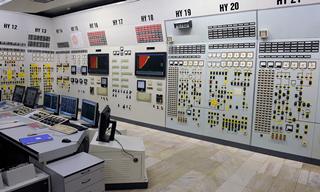|
European Union (EU) countries have started a rethink on their nuclear energy policy following the disaster at Japan's nuclear power plants. 
With opposition to nuclear energy rising among its population, EU heavyweight Germany set the stage for the change on Monday by suspending the plan adopted last year to extend the life of its nuclear power plants.
On Tuesday, the country had decided to shut down seven nuclear power plants on a temporary basis. The plants went on stream before 1980. With this move Germany has become the first European country to take the step after disaster struck Japan. Responding to the disaster, energy ministers and nuclear experts of the 27 EU member states, in an extraordinary meeting in Brussels conducted an overview of the contingency plans and safety measures in place in Europe. They agreed to conduct stress tests on the 143 nuclear power plants in 14 EU countries. The tests would include risk assessments of possible damage by earthquakes, tsunami, terrorist attacks and power fallout, etc. In a radical move, EU energy commissioner Guenther Oettinger, who chaired the meeting, proposed a nuclear-free future for Europe, an issue certain to stir a controversy. "We must also raise the question if we in Europe, in the foreseeable future, can secure our energy needs without nuclear energy," Oettinger told Germany's ARD television. According to Germany's EU commissioner, the policy shift in his home country would impact countries across the EU. "When a large member state like Germany reexamines atomic energy this can have consequences at the European level," said Oettinger. "We must coordinate what is important for us at a European level." Overall nuclear energy contributes approximately 15 per cent of EU's total energy consumption but the energy policies of EU countries vary significantly. Among the 27 EU member states, 14 operate nuclear reactors that produce nuclear energy. France and Britain between them have 58 and 19 plants respectively and are leading supporters of nuclear energy. They consider nuclear to be a dependable source of energy to reduce EU's oil and gas imports from Russia and cut greenhouse gas emissions. However, countries like Austria are strongly opposed to the use of nuclear energy for reasons of safety. The 1986 Chernobyl disaster changed perceptions about the safety of nuclear power plants across much of Europe and according to a survey published in 2007, 39 per cent of EU citizens preferred to reduce the share of nuclear energy in the overall energy mix, while 34 percent would like to keep it at the present level and 14 per cent would like to increase its share. According to analysts the disaster at Japan's Fukushima nuclear plant would intensify opposition to nuclear power with the anti-nuclear gaining strength in the EU as signaled by the Germany policy shift. Meanwhile, facing tough questions an the implications of Japan's nuclear catastrophe for power plants in the US, the Nuclear Regulatory Commission's top official said yesterday at two Congressional hearings that his agency would take a methodical look at Japan and draw necessary lessons. ''U.S. nuclear facilities remain safe,'' Jaczko told two House Energy and Commerce subcommittees, that had originally planned to consider the budget of his agency for the coming fiscal year during the hearing. ''We will continue to work to maintain that level of protection,'' Jackzo said. According to Jackzo reactors were designed to meet the challenges from '' the most severe natural phenomena historically reported.'' He said that for earthquakes, that meant any occuring within 200 miles of the reactor. While it remains to be seen if the Fukushima crisis would take the proportion of the Chernobyl nuclear plant explosion in Ukriane in 1986, it would have much greater direct implications for the US civilian power plant industry, according to analysts. At the time of the accident in Ukraine which was then under Soviet rule, the US had only one reactor that bore any resemblance to the Soviet one and it was soon closed after the accident.
|